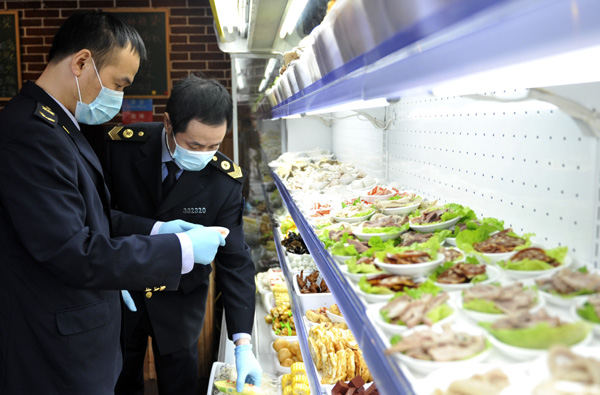What should be done to ensure food security?
Updated: 2016-01-16 09:24
By Wei Longbao and Chen Zhangliang(China Daily)
|
||||||||
 |
|
Food safety administration staffs inspect a restaurant in Ningbo, Zhejiang province, on Nov 10, 2014. [Photo/Xinhua] |
Editor's note: How to ensure food security will be a key issue for the authorities during the 13th Five-Year Plan (2016-20) period. Late leader Deng Xiaoping laid down a principle: China should avoid relying on imports to meet its food demand and grain imports should not be more than 10 percent of its total need. The principle has been emphasized by all Chinese leaders since then.
Wei Longbao
Change practice and import more
Data from 2014 show the principle has been adhered to. China imported large quantities of soybeans, but the import of grains was just a little more than 19 million tons, or 3.1 percent of the total need.
Since 2003 the government has been offering subsidies and buying agricultural products at protective prices to encourage Chinese farmers to grow more grains. That policy has played a key role in increasing China's agricultural production for 11 successive years.
But things have changed in the global agricultural market. As prices of agricultural products overseas have remained low for quite a long time, prices in the domestic market have been falling too. Even though the government still buys grains at protective prices, which are higher than market prices, enterprises that need farm products have been eyeing overseas markets to fulfill their requirements.
Therefore, it is time for the government to adjust its policies to ensure food security. And importing a larger part of the grains the country needs, if handled properly, will not jeopardize China's food security.
Of course, China needs to diversify its imports to avoid relying on one or two overseas supplier and prevent the fluctuations in the global agricultural market from affecting prices at home. As such, the government needs to make more efforts to get more long-term agricultural trade partners overseas so as to avoid trade risks.
Another way of meeting the domestic demand for agricultural products lies in Chinese agricultural enterprises "going global". Some Chinese agricultural enterprises have the technology and funds to operate farms overseas, and the government should encourage them to do so, for the time has come for China to coordinate global resources to ensure its food security.
The author is a senior researcher at and deputy dean of China Academy for Rural Development, Zhejiang University.
- Global health entering new era: WHO chief
- Brazil's planning minister steps aside after recordings revelation
- Vietnam, US adopt joint statement on advancing comprehensive partnership
- European border closures 'inhumane': UN refugee agency
- Japan's foreign minister calls A-bombings extremely regrettable
- Fukushima impact unprecedented for oceans: US expert

 Stars of Lijiang River: Elderly brothers with white beards
Stars of Lijiang River: Elderly brothers with white beards
 Wealthy Chinese children paying money to learn British manners
Wealthy Chinese children paying money to learn British manners
 Military-style wedding: Fighter jets, grooms in dashing uniforms
Military-style wedding: Fighter jets, grooms in dashing uniforms
 Striking photos around the world: May 16 - May 22
Striking photos around the world: May 16 - May 22
 Robots help elderly in nursing home in east China
Robots help elderly in nursing home in east China
 Hanging in the air: Chongqing holds rescue drill
Hanging in the air: Chongqing holds rescue drill
 2.1-ton tofu finishes in two hours in central China
2.1-ton tofu finishes in two hours in central China
 Six things you may not know about Grain Buds
Six things you may not know about Grain Buds
Most Viewed
Editor's Picks

|

|

|

|

|

|
Today's Top News
Liang avoids jail in shooting death
China's finance minister addresses ratings downgrade
Duke alumni visit Chinese Embassy
Marriott unlikely to top Anbang offer for Starwood: Observers
Chinese biopharma debuts on Nasdaq
What ends Jeb Bush's White House hopes
Investigation for Nicolas's campaign
Will US-ASEAN meeting be good for region?
US Weekly

|

|







